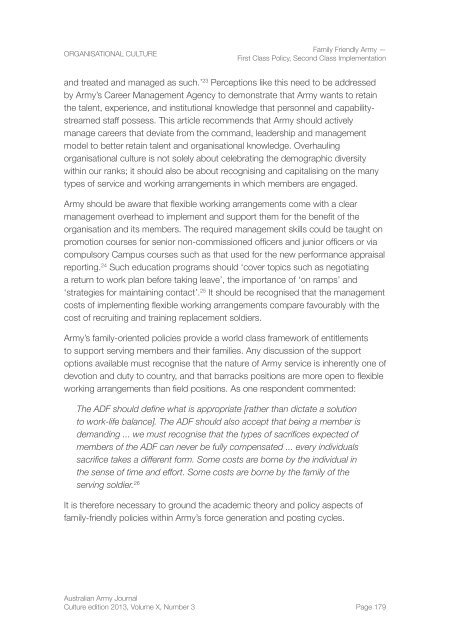Australian Army Journal
Australian Army Journal
Australian Army Journal
Create successful ePaper yourself
Turn your PDF publications into a flip-book with our unique Google optimized e-Paper software.
ORGANISATIONAL CULTURE<br />
Family Friendly <strong>Army</strong> —<br />
First Class Policy, Second Class Implementation<br />
and treated and managed as such.’ 23 Perceptions like this need to be addressed<br />
by <strong>Army</strong>’s Career Management Agency to demonstrate that <strong>Army</strong> wants to retain<br />
the talent, experience, and institutional knowledge that personnel and capabilitystreamed<br />
staff possess. This article recommends that <strong>Army</strong> should actively<br />
manage careers that deviate from the command, leadership and management<br />
model to better retain talent and organisational knowledge. Overhauling<br />
organisational culture is not solely about celebrating the demographic diversity<br />
within our ranks; it should also be about recognising and capitalising on the many<br />
types of service and working arrangements in which members are engaged.<br />
<strong>Army</strong> should be aware that flexible working arrangements come with a clear<br />
management overhead to implement and support them for the benefit of the<br />
organisation and its members. The required management skills could be taught on<br />
promotion courses for senior non-commissioned officers and junior officers or via<br />
compulsory Campus courses such as that used for the new performance appraisal<br />
reporting. 24 Such education programs should ‘cover topics such as negotiating<br />
a return to work plan before taking leave’, the importance of ‘on ramps’ and<br />
‘strategies for maintaining contact’. 25 It should be recognised that the management<br />
costs of implementing flexible working arrangements compare favourably with the<br />
cost of recruiting and training replacement soldiers.<br />
<strong>Army</strong>’s family-oriented policies provide a world class framework of entitlements<br />
to support serving members and their families. Any discussion of the support<br />
options available must recognise that the nature of <strong>Army</strong> service is inherently one of<br />
devotion and duty to country, and that barracks positions are more open to flexible<br />
working arrangements than field positions. As one respondent commented:<br />
The ADF should define what is appropriate [rather than dictate a solution<br />
to work-life balance]. The ADF should also accept that being a member is<br />
demanding ... we must recognise that the types of sacrifices expected of<br />
members of the ADF can never be fully compensated ... every individuals<br />
sacrifice takes a different form. Some costs are borne by the individual in<br />
the sense of time and effort. Some costs are borne by the family of the<br />
serving soldier. 26<br />
It is therefore necessary to ground the academic theory and policy aspects of<br />
family-friendly policies within <strong>Army</strong>’s force generation and posting cycles.<br />
<strong>Australian</strong> <strong>Army</strong> <strong>Journal</strong><br />
Culture edition 2013, Volume X, Number 3 Page 179

















